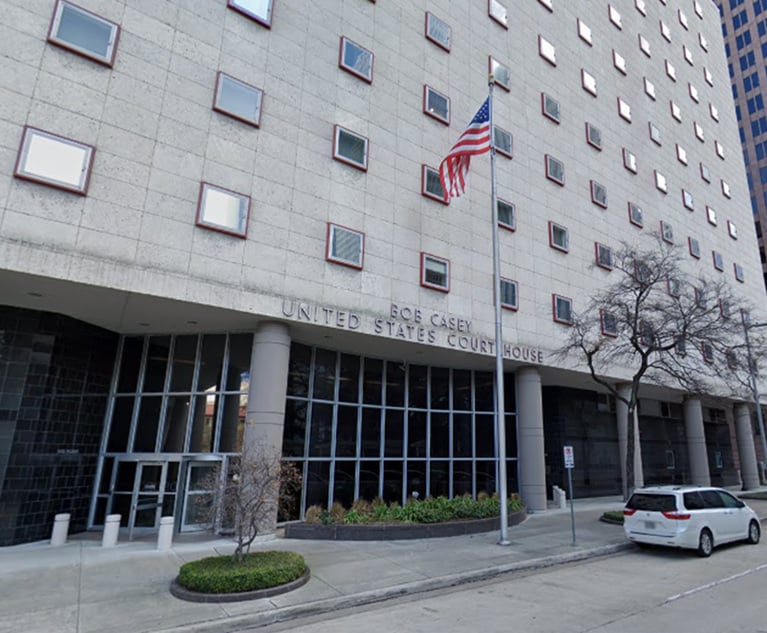Survey: Corporate Execs Optimistic About M&A Market in 2019
While optimistic about the M&A market, survey respondents said most deals will be valued at $100 million or less.
October 17, 2018 at 12:00 PM
5 minute read

Two-thirds of the corporate executives who participated in Dykema Gossett's 14th annual M&A Outlook Survey expect the M&A market to strengthen over the next 12 months—a big improvement over the last three years when fewer than 40 percent expected an improvement in the market.
In addition, “negative sentiment” about the market dropped to 15 percent this year, after hovering around 20 percent for the last three years.
Jeffrey Gifford, a Dykema partner in San Antonio who worked on the survey and is head of the firm's corporate finance practice group, said the survey results show much more optimism than in the past.
 Jeffrey Gifford
Jeffrey GiffordThat optimism is likely a result of “solid economic fundamentals” and strong financial markets during this past summer when the survey was conducted, the report said. A third of the respondents said the current U.S. M&A activity is fueled by the availability of capital, and 31 percent attributed it to general U.S. economic conditions.
As in 2017, the corporate executives who participated in the survey expect that small and midmarket M&A — deals valued at $100 million or less — will increase over the next year. For deals valued from $100 million to $1 billion, 41 percent of the respondents expect them to decrease over the next 12 months.
Gifford said much of the forecast for smaller M&A deals in 2019 reflects the number of owners of small and midsize companies deciding that it's a good time to exit the business.
M&A work is not only an important driver of the U.S economy, but it provides work for law firms. According to a recent Thomson Reuters report, U.S.-based M&A increased 50 percent in volume during the first three quarters of the year when compared with the same period in 2017.
Survey respondents said that recent federal fiscal changes will positively impact the M&A market in 2019. A total of 81 percent of respondents see a significant or somewhat positive impact on M&A from the corporate tax cut, and 78 percent see a significant or somewhat positive impact from favorable U.S. repatriation tax rules.
That plays into the optimism, Gifford said.
“When the corporate tax rate drops as much as it did with the tax cut, you suddenly get a big chunk of change you need to do something with. The question is how you go to deploy it,” he said.
The executives expect to see the most M&A activity in 2019 in the automotive, energy and consumer products industry sectors. In last year's survey, the top three industries were health care, technology and energy, in that order.
The political impact
In questions tied to current events, 30 percent of the respondents said that a change to a Democratic majority in the U.S. House of Representatives with the midterm elections would have a “very positive” impact on the M&A market in 2018, while 16 percent said it would have a “very negative” impact. For a similar change to the blue side of the spectrum in the U.S. Senate, 32 percent said a shift in control would have a very positive impact, and 19 percent forecast a very negative impact.
Gifford said it's hard to interpret how much politics plays into how optimistic corporate executive are about the M&A market in 2019.
“My guess is that some are concerned, for example, or have been … about the way the Trump administration has gone about negotiating trade policy. And I think that has concerned a number of people. Maybe they are thinking, well, with a different Congress, maybe some of those things don't happen so easily,” he said.
Gifford said uncertainty is generally bad for business, but despite that, the executives have a positive outlook for M&A during the next year.
In another topical question, this one related to the #MeToo movement, only 28 percent of the respondents said they were involved in a deal in which a “Weinstein Misconduct Clause” was proposed as a seller representation in an acquisition, while 61 percent said they had not. According to the survey report, those clauses “legally vouch for the behavior of the company's leadership.”
Film producer Harvey Weinstein faces criminal charges in connection with alleged sexual misconduct .
Asked about artificial intelligence, only 28 percent of the respondents reported that they have used AI technology for due diligence on a deal.
The survey, conducted in September, is based on participation by 203 U.S. senior executives who are directly involved in M&A in a range of industries including chief executive officers, chief financial officers, and other corporate executives.
FURTHER READING:
This content has been archived. It is available through our partners, LexisNexis® and Bloomberg Law.
To view this content, please continue to their sites.
Not a Lexis Subscriber?
Subscribe Now
Not a Bloomberg Law Subscriber?
Subscribe Now
NOT FOR REPRINT
© 2025 ALM Global, LLC, All Rights Reserved. Request academic re-use from www.copyright.com. All other uses, submit a request to [email protected]. For more information visit Asset & Logo Licensing.
You Might Like
View All
JCPenney Seeks Return of More Than $1.1M From Jackson Walker For Bankruptcy Work
3 minute read
Ex-Appellate Court Judges Launch Boutique Focused on Plaintiffs Appeals
2 minute read
O'Melveny, White & Case, Skadden Beef Up in Texas With Energy, Real Estate Lateral Partner Hires
5 minute read
Chamberlain Hrdlicka Taps a New Leader as Firm Follows Succession Planning Path
3 minute readTrending Stories
Who Got The Work
J. Brugh Lower of Gibbons has entered an appearance for industrial equipment supplier Devco Corporation in a pending trademark infringement lawsuit. The suit, accusing the defendant of selling knock-off Graco products, was filed Dec. 18 in New Jersey District Court by Rivkin Radler on behalf of Graco Inc. and Graco Minnesota. The case, assigned to U.S. District Judge Zahid N. Quraishi, is 3:24-cv-11294, Graco Inc. et al v. Devco Corporation.
Who Got The Work
Rebecca Maller-Stein and Kent A. Yalowitz of Arnold & Porter Kaye Scholer have entered their appearances for Hanaco Venture Capital and its executives, Lior Prosor and David Frankel, in a pending securities lawsuit. The action, filed on Dec. 24 in New York Southern District Court by Zell, Aron & Co. on behalf of Goldeneye Advisors, accuses the defendants of negligently and fraudulently managing the plaintiff's $1 million investment. The case, assigned to U.S. District Judge Vernon S. Broderick, is 1:24-cv-09918, Goldeneye Advisors, LLC v. Hanaco Venture Capital, Ltd. et al.
Who Got The Work
Attorneys from A&O Shearman has stepped in as defense counsel for Toronto-Dominion Bank and other defendants in a pending securities class action. The suit, filed Dec. 11 in New York Southern District Court by Bleichmar Fonti & Auld, accuses the defendants of concealing the bank's 'pervasive' deficiencies in regards to its compliance with the Bank Secrecy Act and the quality of its anti-money laundering controls. The case, assigned to U.S. District Judge Arun Subramanian, is 1:24-cv-09445, Gonzalez v. The Toronto-Dominion Bank et al.
Who Got The Work
Crown Castle International, a Pennsylvania company providing shared communications infrastructure, has turned to Luke D. Wolf of Gordon Rees Scully Mansukhani to fend off a pending breach-of-contract lawsuit. The court action, filed Nov. 25 in Michigan Eastern District Court by Hooper Hathaway PC on behalf of The Town Residences LLC, accuses Crown Castle of failing to transfer approximately $30,000 in utility payments from T-Mobile in breach of a roof-top lease and assignment agreement. The case, assigned to U.S. District Judge Susan K. Declercq, is 2:24-cv-13131, The Town Residences LLC v. T-Mobile US, Inc. et al.
Who Got The Work
Wilfred P. Coronato and Daniel M. Schwartz of McCarter & English have stepped in as defense counsel to Electrolux Home Products Inc. in a pending product liability lawsuit. The court action, filed Nov. 26 in New York Eastern District Court by Poulos Lopiccolo PC and Nagel Rice LLP on behalf of David Stern, alleges that the defendant's refrigerators’ drawers and shelving repeatedly break and fall apart within months after purchase. The case, assigned to U.S. District Judge Joan M. Azrack, is 2:24-cv-08204, Stern v. Electrolux Home Products, Inc.
Featured Firms
Law Offices of Gary Martin Hays & Associates, P.C.
(470) 294-1674
Law Offices of Mark E. Salomone
(857) 444-6468
Smith & Hassler
(713) 739-1250






